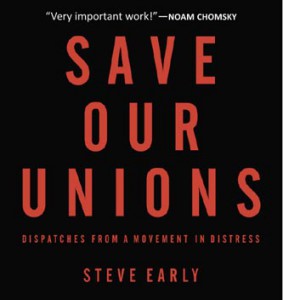Steve Early Speaks With Us About Labor and Single Payer Healthcare
 Steve Early worked for 27 years as an organizer and international representative for the Communication Workers of America. He is the author of a new book from Monthly Review Press titled Save Our Unions: Dispatches from a Movement in Distress. He is working on a book about political change and public policy innovation in Richmond, California.
Steve Early worked for 27 years as an organizer and international representative for the Communication Workers of America. He is the author of a new book from Monthly Review Press titled Save Our Unions: Dispatches from a Movement in Distress. He is working on a book about political change and public policy innovation in Richmond, California.
Question 1: Both your new book Save Our Unions: Dispatches From a Movement in Distress – and your previous one, The Civil Wars in U.S. Labor – draw on your experience as a union negotiator and longtime single payer activist. In 2008, liberal foundations, major unions, and the AFL-CIO created and financed Health Care for American Now! (HCAN). This lobbying coalition had a name similar to ours but it soon distanced itself from the goal of single payer. In retrospect, what impact did HCAN have on labor’s quest for a better health care system?
I think HCAN “settled short” and was too compliant with Obama Administration goals. It also went in the wrong direction by embracing the notion that our system could be substantially improved by mandating and subsidizing the purchase of private insurance, maintaining employer plans where they still exist, and offering a “public option” as a not-for-profit alternative for the millions of new customers now shopping for coverage in our state-based insurance exchanges.
Even after the “public option” was eliminated from that package, HCAN over-sold Obamacare to its labor constituents. In retrospect, we would have been better off if the smaller bloc of pro-single payer unions and the more influential (but always overly pragmatic) organizational players in labor’s mainstream had united around the more modest goal of defending and expanding existing forms of publically-funded healthcare.
Labor’s top priority should have been reversing the partial privatization of Medicare–through the costly and inefficient Medicare Advantage program–which Obama criticized as a presidential candidate in 2008. Lowering the eligibility age for Medicare would have been a good incremental next step in the direction of single payer. Unions and their allies could also have tried to insure more of the low-income uninsured through Medicaid expansion—without the option of privatizing it, which the Obama Administration is now permitting in Arkansas, despite the bad track record of Medicare HMOs.
Labor should also have pushed for more federal support for state level experiments with single-payer—which the ACA has now complicated and delayed. Pre-emptive improvements and better funding of the VA system five years ago—instead of the current emergency intervention—might have strengthened that model of public healthcare delivery, which operates as a kind of British-style national health service for those eligible.
 Question 2: Many labor leaders seem to have a different perspective on the Affordable Care Act today than when it first passed. What’s changed?
Question 2: Many labor leaders seem to have a different perspective on the Affordable Care Act today than when it first passed. What’s changed?
Unionized workers now face more, rather than fewer, health plan problems and cost shifting pressures. In frantic letters to Congressional leaders last year, the national presidents of the Teamsters, Laborers, Hotel Employees, and United Food and Commercial Workers unions warned that the ACA’s “unintended consequences” were multiplying to the point where millions of workers, retirees, and their families face “nightmare scenarios.”
Union members were told, correctly, that the ACA would expand Medicaid access for millions of lower-income Americans and make some important insurance market reforms. But organized labor also expected that this type of health care reform would aid union bargaining by leveling the playing field among all employers, much like the minimum wage and other protective labor legislation does.
Union officials believed, mistakenly, that the ACA would restrain medical cost inflation and corporate pressure for health care give-backs. Instead, those trends have continued to be a major cause of strikes and/or contract rejections at AT&T, Verizon, United Parcel Service, Boeing, and other big employers. In industries with multi-employer Taft-Hartley health care trusts, those are being undermined and put a competitive disadvantage by the ACA.
Some of the worst is yet to come. In both the private and public sector, employers are already citing the ACA’s 2018 tax on mis-named “Cadillac coverage” to justify further givebacks from workers who, in reality, only have a healthcare Chevy in their garage. And this is no “unintended consequence” of the law—it’s what it was designed to do.
According to MIT professor Jonathan Gruber, a top White House consultant, this impending 40 percent excise tax on higher cost plans “is intended to shift compensation away from excessively generous health insurance to wages.” Only someone completely disconnected from U.S. labor relations reality would claim that more premium sharing, higher deductibles and bigger co-pays will translate into better pay for workers, who will, instead, continue to suffer from little or no real wage growth because of such cost chifting.
Question 3: Does this crisis represent a new opportunity for single-payer activists to work with organized labor?
It’s a definitely a great opportunity to revive and strengthen the campaign for Medicare for All, but one fraught with some political dangers. That’s because the boomerang effect on labor and the ACA’s widely publicized implementation screw-ups may also end up discrediting health care reform in general.
Several hundred labor activists met in Chicago in early 2013 under the auspices of the Labor Campaign for Single-Payer Health Care. More than fifty unions and ten city or state labor councils were represented at this gathering. Everyone saw new openings to woo national and local unions previously more wedded to job-based health coverage and their own multi-employer welfare funds.
Later last year, the Labor Campaign collected hundreds of signatures on an “Open Letter to the AFL-CIO from Concerned Trade Unionists” that was distributed at the federation’s convention in Los Angeles. The letter criticized the ACA as the product of lobbying by a private insurance industry “whose business model relies on a failing employment-based system and whose profits depend on shifting costs onto the backs of workers while reducing choice and quality of care.”
However, even after some AFL-CIO convention delegates spent much time venting about President Obama’s failure to “fix” the ACA, only a few national unions have actually gone out, educated their members about this problem, and mobilized them accordingly. That job, as always, will have to be done at the grassroots, from the bottom up—every time a public or private sector union contract is up for renegotiation and management is seeking health care give-backs.
Question 4: For those who would like to learn more about fighting for health care as a human right within the labor movement or in solidarity with the labor movement, what further reading and resources would you recommend?
The Labor Campaign for Single Payer has produced invaluable material for union members on how to deal with the ACA, while fighting for something better at the state or national level, such as this briefing on the ACA for unions and union activists.
Other union critiques of the ACA include a recent UNITE-HERE research report, called The Irony of Obamacare: Making Inequality Worse.
To keep track of what’s happening in Vermont, to make health care a human right there, see the Vermont Workers Center.

Many good points are made here. But I think we continue to miss a key point about ACA. As I understand it, the fundamental ideas behind ACA were ideas that developed on the extreme right many years ago. In the end, it was sold to the American people by ‘progressive’ democrats. The pattern should be clear to us by now. Policies are developed on the right (in right wing think-tanks, etc.) and sold to the people by the ‘progressive’ left. The argument made by the ‘progressive’ left always seems to be “you must pass this reform, even if it’s not ‘perfect’, or else an even worse reform will end up being passed instead.” Well maybe that’s true, but if it is true, can we at least stop calling it “incremental progress”? And doesn’t it sound an awful lot like a form of extortion? In the case of ACA, for example, isn’t it true that millions of uninsured Americans were held hostage for the passage of this bad ‘reform’? I think ACA is just one indication amongst many that real progressivism is a movement in a dire state of crisis that we don’t even see, that we aren’t even talking about.